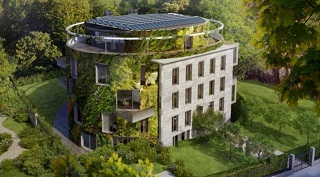From Guest Blogger Lizzie Weakly: Your Civic Duty–How You Can Help Your Community Become Greener

Start a Community Garden
Planting various plants offers several green benefits to your neighborhood. Depending on the plants, you can feed your community with fresh produce. This practice alone reduces emissions in the air because neighbors don’t have to drive to the market for their fruits and vegetables. The plants themselves help the air quality as they transpire oxygen and carbon dioxide too.
Implement Recycling-Bin Usage
Some neighborhoods are limited to just trash bins during their weekly garbage pickups. Contact a local recycling company and inquire about alternative bins. Yard waste, aluminum and paper items can all be separated into various bins so that they’re picked up and recycled. Discarding these items into trash bins alone is detrimental to the environment. Separate bins simply make recycling as easy as possible for the entire community.
Consider Bike Paths
When a community doesn’t have any discernible bike paths, the automatic reaction is to drive a vehicle. Clean up the community’s air quality and reduce the number of vehicles on the road by installing bike paths. These roadways don’t have to be expensive paved areas either. With the city’s approval, a road shoulder or gravel space can become a bike path.
Get Educated
Make your community greener by earning a master’s of law degree online. By studying environmental law, this degree can help you devise and implement better protocols around town. Solar energy used at the government level, for example, might be possible with the help of your advanced degree.
Create Community Clean-Up Events
Trash lining up along community fences and gutters is a possibility for most areas. Gather together some friends and family within the community, and create a cleanup day. Pick up trash each month so that the waterways can remain clean and safe for wildlife. These events also spark conversation among people so that they can learn more about being green.
Once you start a greening process in your community, spread the word to friends and family. They may want to do their civic duty by starting their own green initiative, but they aren’t sure how to start one. With a few tips among friends, a community can become green in only a few weeks.

Good Evening Lizzie,
These are all good , practical and effective measures that can lead to positive programs that get some results.
Some colleagues and myself are working with the PURPA law of 1978 to craft a special solar garden for our local schools and leverage excess production for resale to the local utility at both the avoided cost of fuel and capacity value. This way the District can make a better return on their investment by selling excess power to the Grid during 52 weekends, Holiday season and during 7 or 8 summer peak weeks . The aggregated impact will make a bigger difference and impact, while also creating some learning experience platforms by having schools host solar installations .
Then some of the other good ideas you presented like the community gardens and more recycling programs could gain better traction as they are part of a system of good living.
Thanks for sharing Lizzie take care